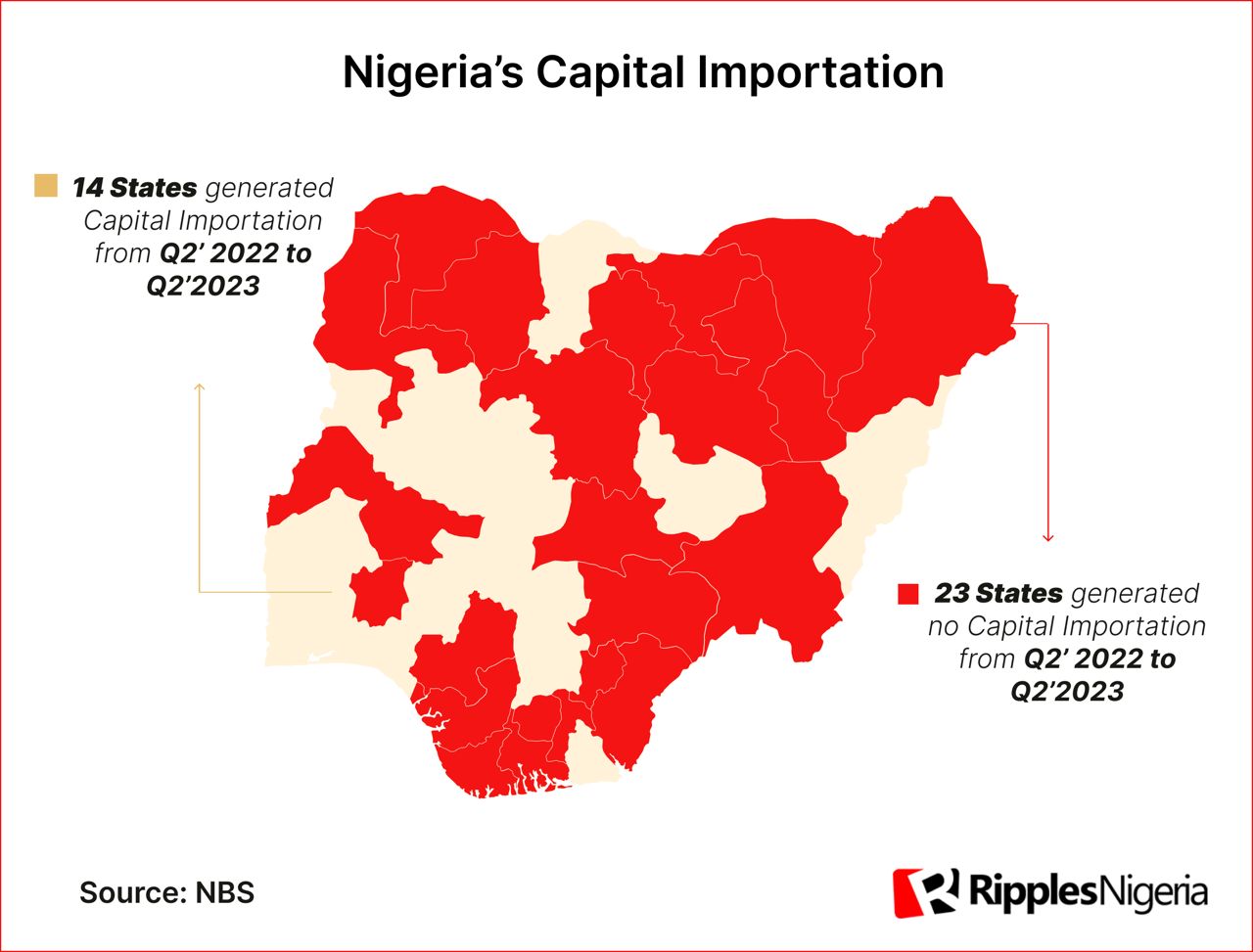Ripples Metrics
RipplesMetric: 23 Nigerian states attracted zero capital inflow in one year

Between the second quarter of 2022 and 2023, at least 23 states in Nigeria did not attract capital importation, findings by RipplesMetrics have shown.
These states are Abia, Bauchi, Bayelsa, Benue, Borno, Cross River, Delta, Ebonyi, Edo, Gombe, Imo, Jigawa, Kaduna, Kano, Kebbi, Kwara, Nassarawa, Osun, Rivers, Sokoto, Taraba, Yobe and Zamfara state.
The total capital importation within the one year was $5.92 billion. When converted using the Central Bank of Nigeria exchange rate of 764.03/1$, this amounts to N4.52 trillion generated as capital importation.
Capital importation is seen as non-residents’ net purchases (difference between purchases and sales) of domestic assets and it is divided, according to the National Bureau of Statics, into three main investment types: Foreign. Direct Investment (FDI), Portfolio Investment and Other Investments.
Meanwhile, of the 14 states, including the Federal Capital Territory, that generated capital importation within the period in view, only Lagos and Abuja (FCT) consistently generated in all quarters.
In one year, Abuja had a capital import of $1.79 billion while Lagos State had $3.98 billion. Checks by RipplesMetrics showed that each of the capital inflow generated by either Lagos state or Abuja is higher than the combined inflow of other generating states.
Further, findings showed that no state in the North West geopolitical region of the country attracted capital importation between Q2 2022 and Q2 2023.
READ ALSO:RipplesMetrics: In 2022 at least 17 people died daily in road accidents
Capital inflow in H1 2023
A report by NBS has shown that capital importation into Nigeria dropped by 9 per cent. The total capital imported stood at $1.03 billion, down from the $1.13 billion recorded in Q1 2023.
Other Investment ranked top accounting for 81.28% (US$837.34 million) of total capital importation in Q2 2023, followed by Portfolio Investment with 10.37% (US$106.85 million) and Foreign Direct Investment (FDI) with 8.35% (US$86.03 million).
The report further showed that the production sector recorded the highest inflow with $605.04 million, representing 58.73 per cent of total capital imported in the quarter. This was followed by the banking sector, valued at $194.58 million (18.89 per cent), and shares accounting for $68.63 million (6.66 per cent).
Findings by Ripples Metrics showed that only eight states and the FCT generated capital inflow into the country for the first six months of 2023. The total capital importation in the first half of 2023 was $2.16 billion.
Abuja, Adamawa, Niger, Ondo, Akwa-Ibom, Ekiti, Lagos and Ogun are the eight states. Going by this data, this means for the first six months of 2023, 28 states have no importation.
RippleMetrics checked through the states data by Nigeria’s geo-political region and learnt that no state in the South-East and North-West contributed to the capital inflow.
RipplesMetrics had reported how the United Kingdom dominated Nigeria’s capital inflow for four years. The latest data by the NBS showed that the UK is still dominating with an addition of $805.13 million to Nigeria’s capital inflow in 2023.
By James Odunayo
Join the conversation
Support Ripples Nigeria, hold up solutions journalism
Balanced, fearless journalism driven by data comes at huge financial costs.
As a media platform, we hold leadership accountable and will not trade the right to press freedom and free speech for a piece of cake.
If you like what we do, and are ready to uphold solutions journalism, kindly donate to the Ripples Nigeria cause.
Your support would help to ensure that citizens and institutions continue to have free access to credible and reliable information for societal development.
























